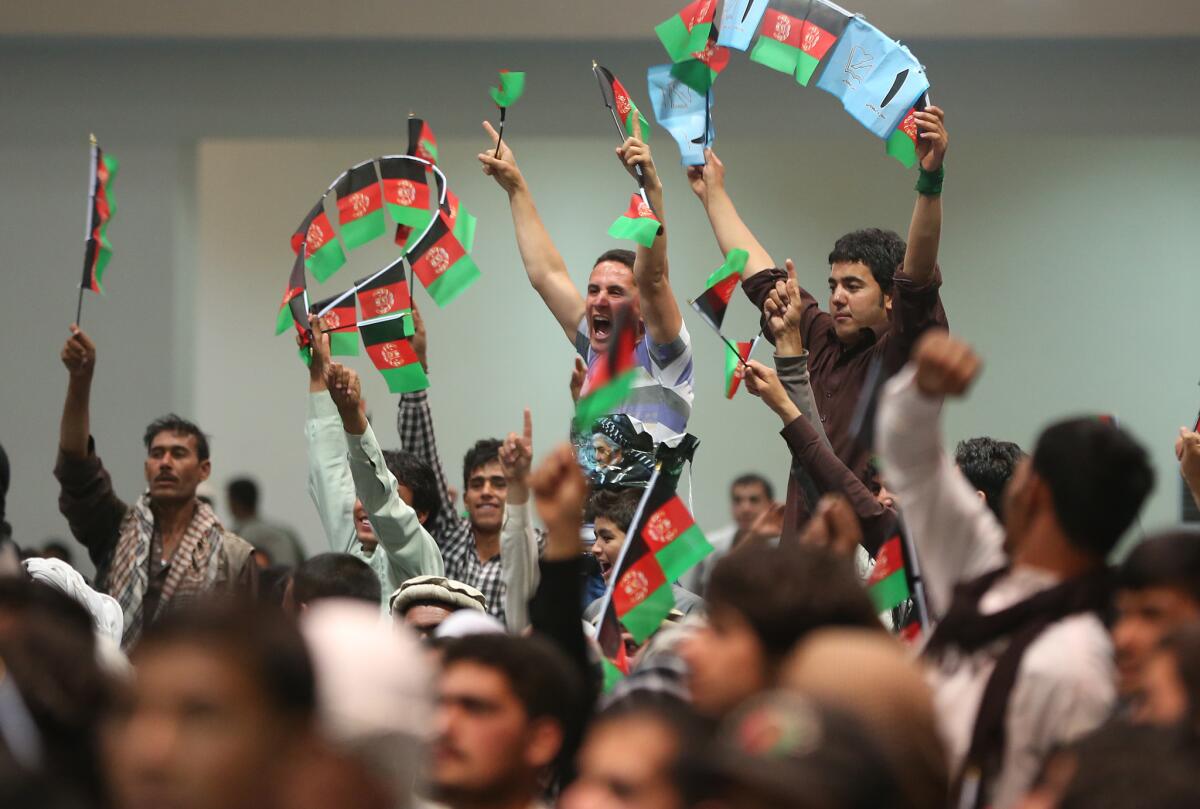Afghanistan presidential campaign stays away from Bergdahl release

- Share via
Reporting from Kabul, Afghanistan — A heated presidential race in Afghanistan leading to Saturday’s runoff election scarcely touched the news that has captivated many Americans for days: the Taliban’s release of Army Sgt. Bowe Bergdahl.
As they crisscrossed the country, neither of the veteran politicians vying to succeed President Hamid Karzai said much publicly about the controversial deal that freed Bergdahl on May 31 in exchange for five Afghans held at the U.S. military prison at Guantanamo Bay, Cuba. Nor did former Foreign Minister Abdullah Abdullah and former Finance Minister Ashraf Ghani address the still distant prospects for an agreement that could end hostilities with the Taliban.
Though each candidate says that reaching a peace deal would be a priority for his government, Abdullah and Ghani have focused their campaigns on economic development, responsible governance and, less loftily, striking pacts with former rivals and ethnic power brokers.
“In a strange way, the Taliban are not a factor in the elections,” said Michael Semple, a former European Union senior official in Afghanistan. “The contest between Abdullah and Ghani is over other things.”
The virtual silence on one of the overriding challenges facing Afghanistan seems odd, but analysts say that both men sought to avoid controversy in the home stretch of a closely watched race. Abdullah appears to have the edge, having won substantially more votes than Ghani in April’s first round of balloting and pocketing several key endorsements since then.
Neither candidate has offered details on how he would bring the Taliban insurgent group to the negotiating table, which Karzai failed to do despite years of on-and-off efforts. The Bergdahl deal has injected new complexity into the process.
Taliban leaders have long said they would negotiate only with the United States, which it considers its main adversary. When the group opened an office in Qatar last year, U.S. officials hoped it would be a precursor to direct talks between the Taliban and the Afghan government.
U.S. officials had sought Bergdahl’s release as a way to build momentum for wider negotiations. But with most U.S. troops leaving Afghanistan at year’s end, the Obama administration made a direct deal to free the 28-year-old soldier who was held captive for five years by Taliban in the mountains of neighboring Pakistan.
The deal concluded one of the United States’ last pieces of unfinished business in Afghanistan but won no assurances from the Taliban on future talks. Karzai fumed over being excluded from the deal, which left the five Talibans released by the U.S. in the custody of the government of Qatar and, in the eyes of many, boosted the insurgent group’s morale.
Borhan Osman, an expert with the Afghanistan Analysts Network, a Kabul-based research organization, said, “This swap was not part of anything related to the peace process…. It was a stand-alone agreement. And as such it is of no help to future talks between the Taliban and Kabul.”
After the Bergdahl deal was announced, Taliban officials reiterated their public position that they would not negotiate with Kabul, a government it considers a Western puppet. The Afghan army lacks the ability to defeat the Taliban outright, and insurgent hard-liners are believed to want to wait out the departure of the last U.S. troops at the end of 2016, when they might have greater bargaining power.
But Osman said the swap has also bolstered the Taliban’s Qatar office, which made the deal, as well as moderates in the insurgent group who are said to favor further negotiations.
With U.S. and international troops withdrawing, leaving the vast majority of military operations to Afghan forces, the Taliban’s rationale that it is fighting foreign invaders is growing obsolete, said Semple, who has studied Afghanistan for more than two decades. That has produced a split in the movement, with some Taliban leaders, who see a military victory as impossible, beginning to favor negotiations.
Analysts say the Obama administration must help Afghanistan’s next president reach out to Taliban pragmatists. U.S. officials have refrained from backing any candidate, but this week left the door open for further American involvement in the peace process.
Another complicating factor could be the presidential candidates’ backgrounds. Abdullah, a senior advisor to the Northern Alliance forces that battled the Taliban in the 1990s, is seen as more strongly opposed to the Taliban than Ghani, who, like the insurgent group’s leadership, is an ethnic Pashtun.
Mohammad Ismail Qasimyar, a member of the High Peace Council, which Karzai appointed to serve as liaison to the Taliban, said he saw no difference between the candidates’ positions on negotiations.
“They both want peace,” Qasimyar said. “They might have different approaches, but what I personally believe is the new government will have a positive impact on the peace and reconciliation process because the winner will have the mandate of millions of Afghans.”
Times staff writer Bengali reported from Mumbai, India, and special correspondent Baktash from Kabul.
For news from South Asia follow @SBengali on Twitter.
More to Read
Sign up for Essential California
The most important California stories and recommendations in your inbox every morning.
You may occasionally receive promotional content from the Los Angeles Times.













